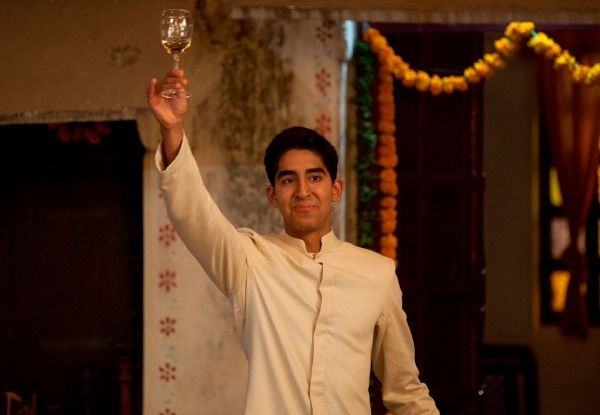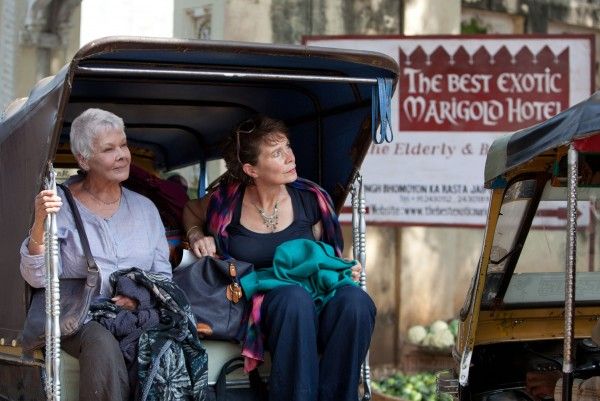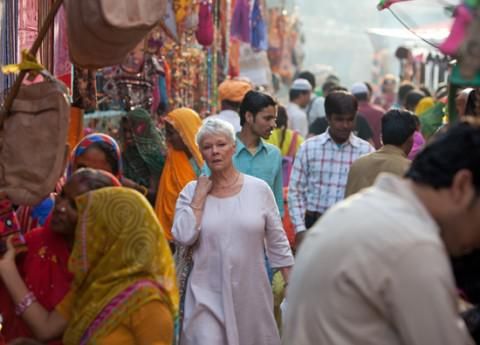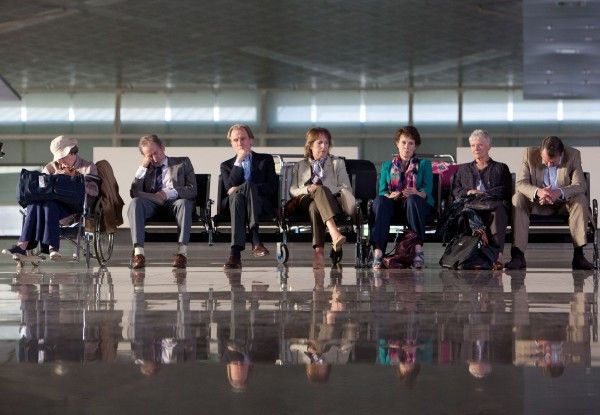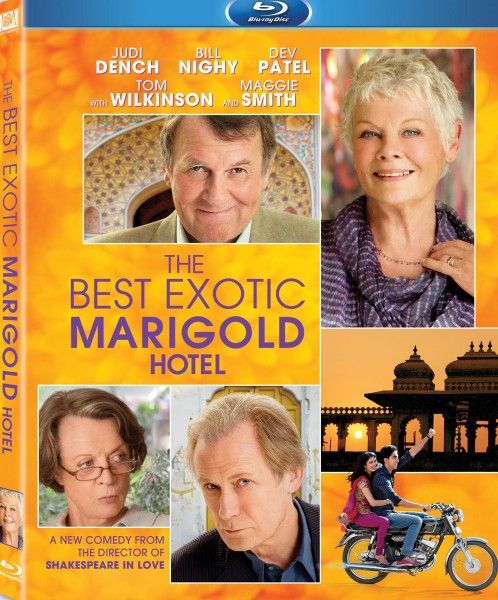One of the biggest surprise hits of this year was The Best Exotic Marigold Hotel, about seven cash-strapped seniors who decide to retire to a resort in far-off India, where they find friendship and romance in the most unexpected ways. In fact, the film did so well at the box office, that there have been recent talks about developing a possible sequel and expanding the cast to include Helen Mirren and Colin Firth. From director John Madden (Shakespeare in Love) and screenwriter Ol Parker, the film stars Judi Dench, Bill Nighy, Maggie Smith, Tom Wilkinson, Penelope Wilton and Dev Patel.
With awards season in full swing – and the film having recently picked up nominations for Supporting Actress (Smith) and Outstanding Performance by a Cast at the SAG Awards, and Best Motion Picture Comedy or Musical and Best Actress (Dench) at the Golden Globes – screenwriter Ol Parker spoke to Collider for this exclusive interview about what a relief the success of the movie turned out to be, that he never considered directing the project himself, how the film’s success has really helped studios realize how viable older audiences can be, his initial reaction to the possibility of a sequel, how far along its development is, and how he’s also writing a romantic comedy pilot for NBC. Check out what he had to say after the jump.
Collider: Obviously, the goal of everyone in the movie business is to have their movie seen by as many people as possible, but how did it feel to find out that it was one of the surprise hits of the year?
OL PARKER: It was just an enormous relief. When they make something that you’ve written, it’s a relief. I wrote a film for Tom Hanks and I wrote two films for Paul Greengrass that didn’t actually happen. The paradox is that the bigger the film you write, the less likely it is to happen. It got very embarrassing to be at various family parties with people going, “So, how’s it all going?,” and you say, “Good!” They say, “Do you have anything to show for all your work?,” and you say, “No, nothing.” So, it was really nice when they made this. It was even nicer when I had that thing where, even when people haven’t seen it, they at least know that it happened. They just chose not to see it because they hated the idea of it, but they know about it. That’s a tremendous relief. Not that I credit myself with the success of the movie, but it seemed to strike a chord with people and that’s a fantastic relief. More than pride and pleasure, relief is the primary emotion.
When did you realize just how well the film was doing?
PARKER: I think films are a really small target. They’re really hard to make, and they’re a really tiny target. I did get the feeling, when we were in India, that this was a much bigger, slow moving target because we had those guys and we had India. We had to really suck to not be adequate because we had the Dame (Judi Dench) and Bill Nighy. All of my friends were like, “What are you doing? What’s happening in India?” And I was like, “Well, Bill Nighy and Judi Dench are falling in love while Maggie Smith wanders around being racist, in the background.” They were all like, “That’s it, I’m in!” And then, watching it and leaving my stuff aside, I thought it was the good version of what it could have been.
Having spent so much time on this film, before it went into production, had you ever given any thought to directing it yourself?
PARKER: No, I absolutely wouldn’t have had a clue. I tried to quit when John [Madden] signed on. We had four different directors, and I hated at least two of them. It’s absolutely a director’s prerogative, and so it should be, to make the script theirs when they sign on, but the difficulty comes when the next guy signs on and wants it to be the opposite. It was such a hellish gig. I hated it. I went to the producer and begged him to let me go. And then, they said, “Wouldn’t it be brilliant if John Madden directed Judi Dench in this?” The trajectory of most movies is that you start off writing a sensitive movie about a couple in their 40's getting divorced, and then, three years later, you look at each other on set while you’re making a film about lesbian cheerleaders. You’re like, “How did that happen?!” The process of development moves it further and further away, and that was starting to happen with the different directors coming on. And then, Judi signed on. God bless her, that yanked the film back to what it was. And then, John came on shortly after that and, suddenly, there it was. Once Maggie Smith had signed on, I was very sure I wouldn’t be going anywhere near that.
Are you surprised that it’s taken as long as it has for studios to notice that older audiences are viable and should be recognized and catered to, in some sense?
PARKER: Yeah. Now, they behave as though they knew all along, but it was really tricky to get going, even with the cast that we had. It’s great that we’ve got a cast of all-stars, and we’re intensely proud of that, but it was very clear to us that, if we didn’t get the cast of all-stars, it wasn’t happening. We needed to get that level of cast. Judi and Maggie don’t do it on their own. Judi, Maggie and Bill don’t do it on their own. I don’t know if it was the zeitgeist, or we just got incredibly lucky. Maybe it just took us so long to make that the fashion came back around. Now, they’re all trying to make more and talking about it as a movement.
How did you react when you learned that the studio wanted a sequel? Was that something you immediately wanted to be involved with, or did it take some convincing?
PARKER: A bit of both, I think. It was hilarious, for a start, because we were in such agony trying to wrap the fucking thing up so neatly. We crow-barred a happy ending. The strongest criticism that you could make, and that I would agree with, with the film is that it works very hard in the final act to get everything sorted out. And John was always quite happy with that. He was like, “It’s a Shakespearian comedy world where everything comes right, in the end,” so we went with that. But, if we’d had any idea on set that there might be more to come, than we wouldn’t have tied things up nearly so neatly. So, I was stunned, and then weary. I’m really proud of it, to be honest. I like Judi riding off into the dawn, as just a girl on a motorbike saying, “Everything will be all right, in the end.” I was at lots of screenings and that made people really happy. I wouldn’t want to tarnish that by coming out with a money-grubbing, less good sequel. But then, John and I hung out for a week and started making each other laugh. We had a really good time and we started to think about what we could do. It was nice because we don’t feel pressured into doing it. We don’t feel that we have to do it. If I do write it, hopefully we’ll be honest with each other and, if we don’t think it’s good, we just won’t do it. And I think the actors would be honest with us. They’ve already said yes, which is really lovely, but I’d like to think that, if they read it and thought it wasn’t up to it, then they’ll tell me and we’ll either make it better or brush it off.
When you decided to gauge their interest to see if they were interested in returning, were you worried that they might tell you no?
PARKER: No ‘cause I knew that they’d loved India. I knew Maggie wouldn’t say yes because she’s Maggie Smith and she’s going to make you dangle and wait. She said she’s only do it, if I called it Marigold Hospice, which is a typical Maggie-ism. But, I knew the others would say yes. It was a fairly easy call. The weirdest one was Penelope Wilton, whose character left India. I’ve got no idea if she’s coming back, but she was like, “Oh, I’m coming back! You’re writing me in, no question!” The others weren’t going to say no. They can read it and pull out. But, we had an amazing time making it, genuinely, so I was fairly confident, now anyway, that they’d want to go back. Although, if I don’t finish it for a few months, who knows.
Have you done any actual writing on the script, or are you just working out ideas about where it could go?
PARKER: A bit of both. There’s no deal with Fox Searchlight yet, so no one has seen it, but John.
Is there any truth to the talk about Helen Mirren and Colin Firth being added to the cast for the sequel?
PARKER: I don’t know how that got out. Yes and no. There’s no script. They’re both friends of John’s and they’ve both worked with John before, but there’s no script, so it’s wildly premature to talk about other people. Someone said Jane Fonda, as well. I think that’s fantastic! I’d be happy to write a part for her. We should be so lucky.
When you’re writing something, is it easier for you to know specifically who you’re writing for?
PARKER: Yes, and I will now be writing for Colin Firth and Helen Mirren. I wrote this film with Judi and Maggie in mind, very consciously. It was a very deliberate thing. I tried to write roles that would snare them. I do that, in general, even if you know you’re never going to get them. It helps me personalize or give voice to a character. Although it tends not to be movie stars. As obviously brilliant as Matt Damon is, I don’t think I’ve ever written a part for him. With this one, I certainly had Judi in mind because she’s so lovely, so honest and so open, and those were qualities that I wanted for Evelyn, the lead woman.
How was the experience of being on set in India every day?
PARKER: I think they couldn’t afford to fly me back and forth, so they just left me there. No. It was amazing! It’s not typical, and I think that’s a shame and I think that’s wrong. The primary relationship on a film, where possible, should be between the director and writer. Luckily, John is genuinely the nicest man in show biz and one of the most brilliant, so he’s very secure. I’ve been on set with things I’ve written before and actually been helpful, but sometimes if the director sees you talking to the actor, they’ll be like, “What was that about?” There should be very clear lines of communication. If an actor comes to you and goes, “John wants this to be angry and I think it should be sad, what do you think?,” I would never disagree with John, even if I did secretly disagree with John. I would back him up, and then go and talk to John. But in this case, that just didn’t arise. They’re all theater actors, as well, so they’re very used to working with the writer and having the writer around. John is totally secure and hopefully enjoyed my nonsense next to him at the money. He indulged it, anyway. So, I just got to hang out and watch these geniuses, which was the greatest privilege of my life. The idea that you’d be anywhere else is nonsense to me.
Were there any scenes or moments that you were most excited about seeing brought to life, and were there scenes that had to get deleted that you were sad about not making it into the film?
PARKER: No. Because the script was too long, anyway, and the film is arguably too long, it was always tight. There were nine plotlines to juggle. That’s part of why the script took so long and partly why each director could change it so much. All films are subject to change, but this film was particularly because it could go in so many different ways with so many different emphases. But, John knows his shit, so by the time we shot, it was pretty much locked down. Filming in India has its logistical challenges, so it authenticates itself, every day. If you’re making a film about chaos, there’s no better place to make the film than India. Every day was extraordinary and a challenge. But, the very last scene was amazing. I don’t know if you’ve ever looked at Bill’s hands, but he has a muscular condition where three fingers of his right and left hands are kind of attached to the palm of his hands. You can see that some of his fingers don’t function, so they’re curled into his hands. So, he’d never ridden a scooter before. We had to doctor the scooter and teach him how to ride it, and he had Judi Dench perched sideways on the back, beaming and smiling out at the world. He was absolutely shitting himself, after each take. It was quite hard logistically because they had to turn the corner and there were various cows wandering across the shot. John was like, “Do it again,” and Bill was like, “I can’t! I can’t! I’m going to kill Judi Dench!” So, that was a day. My task that day was to keep Bill calm. He genuinely was shaking because he was so scared. I had to keep telling him it was going to be fine. God bless him, we were all terrified. But, Judi just hopped on the bike with laughter.
Are you the kind of person who likes to have multiple projects in development at one time, or do you prefer to focus on one project at a time?
PARKER: I tend to only be asked to write one thing at a time. I’d love to have a whole list of things, but that generally doesn’t work out. People don’t employ me enough to have that luxury. There are not many things I have going, at any time. I’m quite lazy and I’m not that ambitious. I’ve got a really nice family and I like hanging out with them. It would be nice to be offered lots of things, but that just doesn’t work out.
So, are you just working on the Marigold sequel right now then?
PARKER: I did just do a TV pilot for NBC. It was one of those things that you do every summer, that they never make. I’m doing that now, and it goes in before Christmas. That’s meant to be a romantic comedy. At least, that’s the plan. There are some laughs in it. And then, I will be doing the Marigold sequel after Christmas, if Fox asks me to.
The Best Exotic Marigold Hotel is now available on Blu-ray/DVD.


